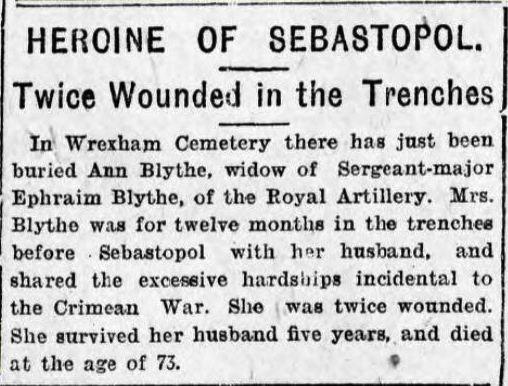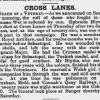A SOLDIERS WIFE - ANN BLYTHE 1829 – 1901 Ann Griffiths was born about 1829 in Whitford, Holywell, her parents are unknown. By 1861 she had left Wales and was working as a servant in the Marine Hotel, Liscard. The Marine Hotel was quite a new establishment as it had only opened on the Promenade in 1845. In the summer of 1852 Ann married Ephraim Blythe in a Civil marriage in Liverpool. Her husband was a soldier. Ephraim had been born in 1824 at Hoole, Chester; he was the son of John and Mary Blythe. He had worked as a gardener in Chester, but in 1851 he was in the Barracks at Chester Castle where he was a Bombardier with the Royal Artillery. Just a few years later he was sent to the Crimean War. Ephraim is listed in the Medals Roll Index for men who served in the Artillery and Engineers, Royal Artillery Regiment 7th Company. 5th Battalion Royal Artillery 1st October 1854 to 9th September 1855. He had been wounded in the arm on 6th June 1855 and was listed in the Gazette as 2134 Ephraim Bligh, Bombardier, Royal Artillery. By 1861 the couple were at the Barracks at Gorleston, Suffolk where Ephraim was a Corporal with the Royal Artillery coast brigade. On 3 July 1866 Sergeant Ephraim Blythe was awarded a pension after serving for 23 years and 55 days, he had completed his service. He had served in Corfu for 3 years and Crimea for 1 year. His conduct had been exemplary and he had been awarded 4 good conduct medals, a silver long service medal. He also had the Crimea medal with the Sebastopol Clasp and the Turkish War medal. There is no indication as to when Ephraim was in Corfu, but it came under British rule after the defeat of the French at Waterloo in 1815. During 50 years of British rule the island was garrisoned. The islands were ceded to Greece in 1864. By 1871 they were both at the Rupert Lane, Militia Barracks. Everton. This area was named to commemorate the royal visit of Prince Rupert in 1644. Ephraim’s occupation was given as “Royal Lancs artillery militia and Chelsea pensioner “. By 1881 they have moved to Wrexham, they are in the Dunks, Abenbury Fawr. With them is an 8-year-old niece, Dorothy Campbell who was born in Cheshire. They are still in Dunks Cottage in 1891; it was in the same area as Llwyn Onn Hall. Ephraim and Ann moved again by 1896, when they were living in Cross Lanes, but he died there on 16th April aged 72. There was an obituary in the Wrexham Advertiser. DEATH OF A VETERAN. As we announced on Saturday morning the roll of those who fought in the Crimean is reduced by one. Ephraim Blythe who died at Cross Lanes on Thursday, after 2 days illness and at the age of 72 was one who took part in that campaign. He was a member of the Royal Artillery and for twelve months was in the trenches before Sebastopol. He was wounded twice by shells, and left the army with the rank of Sergeant Major. He had the Crimea Medal with the clasp for Sebastopol, the Turkish medal and the medal for good conduct. Mr Blythe who had served 23years with the colours, finished his time with the volunteers. He had married a Welsh girl who accompanied him through the war and still survives him. At one time he was a policeman on the Wrexham, Mold and Connah`s Quay Railway and for 20 years had been the night watchman at Cobden Mill. The funeral took place in Bangor Churchyard on Saturday. Ann continued to live in Cross Lanes; she was there in the 1901 census. She died in November 1901 and was buried in Wrexham Cemetery on 28 November 1901; the service was performed by R. J. Oliver, the Curate of Wrexham. On 30th November a notice was printed in many newspapers, not just in Wales but also in England. HEROINE OF SEBASTOPOL. Twice Wounded in the Trenches. In Wrexham Cemetery there has just been buried Ann Blythe, widow- of Sergeant-major Ephraim Blythe, of the Royal Artillery. Mrs. Blythe was for twelve months in the trenches before Sebastopol with her husband, and shared the excessive hardships incidental to the Crimean War. She was twice wounded. She survived her husband five years and died at the age of 73. It was sad enough that Ann was parted from Ephraim, it was only 5 miles to his grave, but what wasn’t made known is that she died in the workhouse where she was registered as a pauper. Ephraim’s pension from the Army would have ceased when he died and Ann must really have fell on hard times. Surely the authorities knew her history, her story was out there. There was a grave in Bangor where she could have been laid to rest with her husband. She had even gone to war with him and deserved much more respect. By the end of 1901 another nine people were buried in the same plot, two were babies and some of the others from the workhouse. Their graves are in consecrated ground section A 00432. There are no official registers of soldier’s wives, and only the letters and stories from the most senior offices wives tell of the ordeal they faced. Florence Nightingale was far the most well-known. The class divide was firmly in place in the 1850s and women’s experiences were dictated entirely by their husband’s rank, with the soldiers’ wives having by far the worst time of it. Only four per company were chosen by ballot to ‘follow the colour’ and most immediately regretted it. But an estimated 750 to 1,200 women went east with the expeditionary force in the spring of 1854, and by the end of the war an additional 250 had travelled out as nurses. Only half of them returned. From the moment they stepped on the boat, it was clear they would endure terrible suffering. The army took them under sufferance and many of the women were kept below decks for the entire voyage. In the older vessels there was no escaping the dark, damp, airless atmosphere which stank of sweat and vomit. Nor was it possible to stand upright in such confined spaces. The plan had been to take Sevastopol quickly and get home by Christmas, but the generals dithered, and it soon became clear that the troops and their wives would be stuck there through a freezing Crimean winter, without adequate shelter, food, winter clothing or medical supplies, because no one had thought they’d be needed. Soon the area round the British camp was stripped of firewood and every last edible plant had been dug up and boiled. The women huddled together in dirty wet blankets, weak with hunger, as temperatures plummeted. Perversely, some women later claimed to have enjoyed their experiences in Crimea. Mary Ann Jones of Welshpool, who spent the war as a washerwoman, said she “hadn’t done so badly” because she left England with one sovereign and came back with seven as a result of the pay she received. But most were traumatised, especially those who had to bury their husbands and scrabble around for passage home. Countless women were buried on the Crimean Peninsula in simple graves that no longer survive, victims of illness, cold and starvation. Out of an estimated 750 to 1,200 women, only half returned. It would be the last war in which wives accompanied the British army, because it was decided that the strain they placed on resources outweighed the benefits of their presence. Looking back, you can’t help but admire those women in the Crimea who, along with the nurses such as Florence Nightingale and Mary Seacole, showed the Victorians they were made of much tougher stuff than anyone had previously imagined. Researched by Annette Edwards, with military help from Max D and R Pitt. December 2018. Grave ref: Wrexham Cemetery A-00432.
Story added by Graham L
Mynwent Wrecsam
Wrexham a’r Rhyfeloedd



